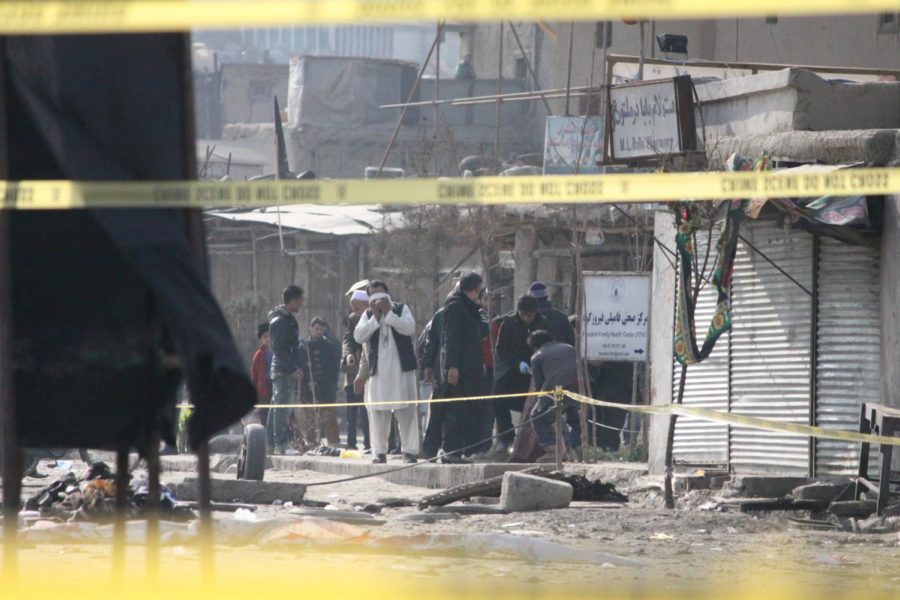Dozens killed in rare Afghanistan attack
Photo courtesy of Masoud Popalzai
At least 18 people are dead after explosions in the Afghan cities of Kabul and Mazar-e Sharif on Tuesday, the Shiite holy day of Ashura, officials said. One attack occurred when a bomber detonated a device at a Shiite shrine in Kabul, killing 14 people, Afghan Health Ministry spokesperson Kargar Norughly said. Another 105 were injured. In this photo, a man weeps as a body is brought out from the blast site.
December 6, 2011
Twin suicide bombings killed dozens Tuesday in Afghanistan, most of them in a mass-scale sectarian attack on Shiite worshippers unlike anything the country has seen in its decade-long war.
Explosions in the cities of Kabul and Mazar-e Sharif killed 58 people and wounded scores of others, officials said.
A suicide bomber detonated a device at a Shiite shrine in Kabul as worshippers were marking the Shiite holy day of Ashura, Afghan Health Ministry spokesman Kargar Norughli said. Fifty-four people were killed and 150 were wounded, said Afghan Health Ministry spokesman Kargar Norughli.
Four people were killed by an explosion at a roundabout on a busy street in Mazar-e Sharif, the provincial capital of Afghanistan’s northern Balkh province, police official Lal Mohammad Ahmadzai said. Another 21 were wounded in that attack.
“The enemies tried to spread fear in this important holiday in the city,” Ahmadzai said.
There was no immediate claim of responsibility for the attacks. The Taliban denied involvement.
The U.S. Embassy in Afghanistan issued a statement condemning the “the twin suicide bombings that killed dozens of worshippers, many of them women and children.”
The bombs detonated nearly simultaneously, the statement said.
Afghanistan has seen attacks on mosques. In 2006, rioting broke out between Shiites and Sunnis at an Ashura festival in Herat, leading to several deaths. But the country has not seen sectarian attacks of the scale that occurred in Tuesday’s bombings. Such sectarian bombings have occurred more frequently in Iraq.
The attacks came a day after an international conference in Bonn, Germany, addressed the state of affairs in Afghanistan, and Afghan officials pushed for international support and contributions.
The U.S. Embassy statement Tuesday vowed that the United States “remains undeterred in standing with the Afghan people against the scourge of terrorism in our mutual aim of promoting peace and prosperity.”
Gen. John Allen, commander of NATO’s International Security Assistance Force, said, “An attack against Ashura pilgrims on one of the holiest of days in the Islamic calendar is an attack against Islam itself, and we denounce and condemn these atrocities in the strongest of terms. Our prayers and deepest sympathies are with the families and loved ones of those innocent civilians killed or injured in today’s horrific attacks.”
Ambassador Simon Gass, NATO’s senior civilian representative in Afghanistan, called the attacks “horrifying.”
“That men, women and children are killed and injured on Ashura is particularly tragic,” he said.
Ashura commemorates the martyrdom of Hussein, grandson of the Prophet Muhammad. Hussein’s death in battle in Karbala, Iraq, in 680, is one of the events that helped create the schism between Sunnis and Shiites, the two main Muslim religious movements. Shiites are a minority presence in Afghanistan, which is predominantly Sunni.
At the Bonn conference on Monday, Afghan President Hamid Karzai warned that the Taliban could make a comeback as the country struggles with security a decade after a U.S.-led coalition ousted the hardline militia from power.
“If we lose this fight, we are threatened with a return to a situation like that before September 11, 2001,” Karzai said.
In an e-mailed statement to journalists, Taliban spokesman Zabiullah Mujahid said he condemned Tuesday’s attacks. He accused NATO forces of playing a role in the attacks “to sow mistrust and hatred among Muslims so they can stay longer.”
Karzai, at Monday’s conference, said that though there had been progress over the past 10 years, stability remains a distant goal.
“Our shared goal of a stable, self-reliant Afghanistan is far from being achieved,” he said.
— CNN’s Mohammed Tawfeeq contributed to this report.







